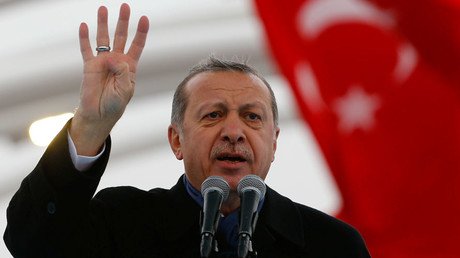Syria ceasefire brokered by Russia, Turkey & Iran has better chance of holding – ex-Turkish US envoy
The Syria truce negotiated by Russia and Turkey is “only a first step” down a road towards political settlement, but may prove to be long-lasting due to the ability of the parties to speak to the government and the rebels, Osman Faruk Logoglu told RT.
The new ceasefire plan, which Ankara announced on Wednesday but Moscow was yet to confirm, was preceded by trilateral talks between Tehran, Moscow and Ankara. Conducted at the level of foreign and defense ministers, last week’s talks resulted in a declaration which outlined the principles of a potential ceasefire.
“Iran, Russia and Turkey are ready to facilitate the drafting of an agreement, which is already being negotiated, between the Syrian government and the opposition, and to become its guarantors,” the document signed in Moscow on December 20 read.
Logoglu, who served as Turkey’s Ambassador to the US in 2001-2005, said that while every effort to bring hostilities to an end in Syria is important, the fact that Russia, Turkey and Iran endorsed this particular deal makes it more viable in comparison to previous arrangements.
“This [ceasefire] has a better chance of holding up because Turkey was supporting the opposition, and Russia and Iran were supporting the regime,” he said, adding that the deal would not be possible without preliminary consultations with the Syrian government and armed opposition.
READ MORE: ‘Erdogan’s accusations of US supporting terrorists a parting shot for Obama’
At the same time, while the deal might ease the situation on the ground, the former ambassador said that it is “only the first step” which, along with a proposed meeting in Kazakhstan, “should facilitate the way to the Geneva peace process.”
The announcement of the agreement comes against the backdrop of heightened tensions between Turkey and the US. On Tuesday, Turkish President Recep Tayyip Erdogan blamed the US-led coalition for supporting Kurdish militias and even Islamic State (IS, formerly ISIS/ISIL) in Syria.
While the sharp difference in treatment of US-backed Kurdish People’s Protection Units [YPG], which Ankara considers terrorist, did not come as a groundbreaking revelation, it was the first time the Turkish president openly accused the coalition forces of backing IS. The claims were dismissed by the US State Department spokesperson Mark Toner as “ludicrous.”
Logoglu said that despite the difference of opinion on the issue of Kurds, this problem is not “unmanageable” and that he is sure “the US will not undermine by any action or at least should not undermine by any action or lack of action this movement to a general ceasefire in Syria.”
Although “so far the United States seems to be excluded from this [peacemaking] process” Turkey, Russia and Iran “must make sure” that some sort of coordination remains place with the US as well as the UN, the diplomat argued.
“When you combine these forces, Russia, Turkey and Iran for a ceasefire and for an eventual settlement in Syria you might not need the US all that much but as I said before all that actions must be taken in consultation, close coordination with US on one hand and the UN on the other hand,” he said.
Moreover, Logoglu suggested that the US might contribute to the reconciliation process and must follow the example of Turkey, Russia and Iran, who managed to “harmonize” their policies on Syria despite their original positions being quite different.
“The US should also review its position in Syria, and help this effort, first – ceasefire, and then negotiating settlement for Syria. This is the way to follow,” Logoglu said.
The statements, views and opinions expressed in this column are solely those of the author and do not necessarily represent those of RT.













